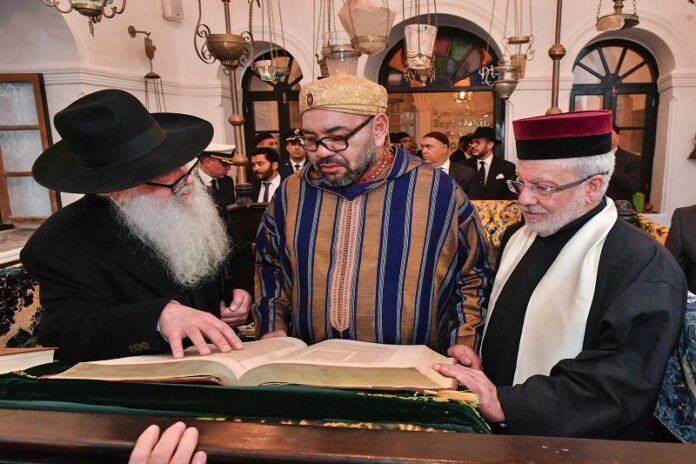The history of Morocco cannot be fully understood without considering the Jewish component, which has, for centuries, been an integral part of the country’s social and cultural fabric. This shared memory is not just a chronicle of events; it is a living lesson in coexistence, plurality, and the ability to integrate differences.
In this article, we highlight Dr. Eidoudi Abdelnabi’s reading of the history of Jews in Morocco, seeking to uncover the lessons this heritage can offer to Moroccan society today, and how it can be used to understand the present and build the future.
Reading and Dialogue with Dr. Eidoudi Abdelnabi’s Ideas
As part of our editorial tradition, which blends analytical reading with intellectual inquiry, we engaged in a thoughtful exchange with Dr. Eidoudi Abdelnabi, a researcher in religious and political affairs, regarding his rich article on the history of Jews in Morocco.
Our aim was to understand, with him—and through him—the contours of this historical component of Moroccan society, and to raise with him, and with his text, questions about the present and the future.
The First Migrations… Questioning the Origins
Dr. Eidoudi states that Jewish presence in Morocco is deeply rooted in antiquity, with the first waves arriving after the destruction of the First Temple in 586 BCE via Phoenician routes, settling in various regions, including what is now known as “Aït Daoud.” We ask him: was Morocco merely a geographic choice, or an attractive civilizational space? He responds that Morocco, by virtue of its location and cultural diversity, has always been a land of welcome—something that was renewed during the Andalusian migration of the 15th century after the fall of Al-Andalus and the expulsion of Jews and Muslims.
A Dual Identity… Between Natives and Newcomers
Dr. Eidoudi explains that Moroccan Jews can be divided into “natives,” who settled before Islam, and “newcomers” from Andalusia and Europe. We comment: this dual composition is not a mere demographic detail; it is a key to understanding Morocco’s cultural diversity, as it produced a hybrid Moroccan Jewish identity that combines deep local roots with Andalusian and European openness.
Coexistence… Between Historical Narrative and Lived Experience
Dr. Eidoudi affirms that Jews were not strangers to their Moroccan surroundings. They shared with Muslims the language, customs, and festivals, while maintaining autonomy in their religious and judicial affairs. We wonder: was this coexistence solely the product of tolerance, or also the result of political and economic balances?
The Sultan and the Mellah… Symbolism of the State Relationship
Dr. Eidoudi recalls the relationship between Jews and the Moroccan state, from permission to reside within the walls of Fez during the Idrisid era, to the creation of the mellah under the Marinids.
He particularly highlights Sultan Mohammed V’s refusal to comply with the discriminatory laws of the Vichy government, affirming that Jews were Moroccan citizens. In our view, this was not just a political decision but a principled declaration of an inclusive concept of citizenship.
From Independence to the Diaspora… An Unbroken Memory
Dr. Eidoudi points out that Jews took part in shaping modern Morocco after independence. Even with waves of migration to Europe and America, the bond with Morocco has remained alive. We believe this connection is today a cultural asset that can be used to build new bridges between Morocco and its international environment.
The Question of the Future
At the end of our discussion, Dr. Eidoudi leaves an open question: how can this heritage inspire the present? We add: if the past proved Morocco’s ability to embrace diversity, do we today have the courage to use this experience as a global model for coexistence?
Conclusion and Analysis: Lessons from the Past for the Present
At a time when Morocco is experiencing rapid political and social transformations, the history of Moroccan Jews stands as a mirror reflecting the society’s capacity to live with diversity. The millennia of experience highlighted by Dr. Eidoudi remind both policymakers and citizens that a state’s strength lies not only in its institutions but also in its ability to embrace difference and guarantee equal rights for all, without religious or cultural discrimination.
Today, amid debates on democratic openness, equal citizenship, and social integration, this heritage offers a living model of both pragmatic politics and ethical principles. The question remains: can Morocco leverage this shared memory to strengthen trust among all components of society and direct it toward a comprehensive national project—one that links past and present to create a brighter future?


